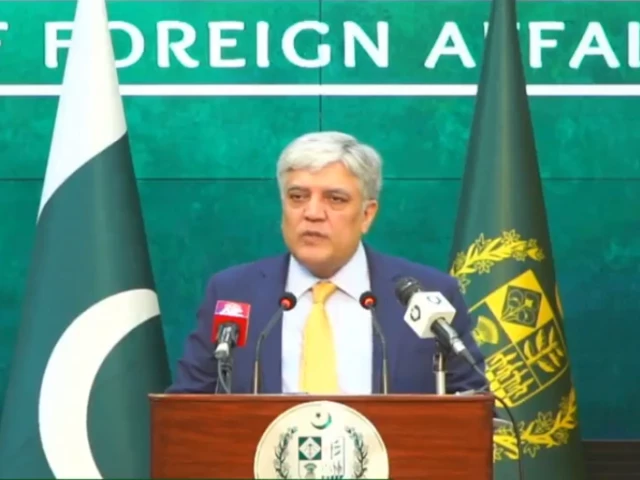FO slams India's 'Operation Mahadev' as 'entirely fabricated'
Spokesperson says claims are false and reflect a dangerous bid to justify unprovoked aggression against Pakistan

Pakistan has firmly rejected the unfounded assertions made by Indian leaders during the recent Lok Sabha debate on the so-called “Operation Sindoor.” According to the Foreign Office, the statements are part of a broader pattern to distort facts, justify aggression, and glorify conflict for domestic purposes.
During a media briefing on Friday, FO Spokesperson Shafqat Ali Khan stated that India’s attack on Pakistan, targeting alleged terrorist infrastructure, resulted in the loss of innocent lives. Despite this, Pakistan successfully neutralised Indian fighter jets and military targets, highlighting the failure of India’s military objectives.
“The world knows that India attacked Pakistan without any verifiable evidence or credible investigation into the Pahalgam attack,” he said. “Pakistan’s actions in defending its territory were indisputable, and we strongly reject any further claims regarding the so-called ‘Operation Mahadev,’" he added.
The spokesperson also criticised India for rejecting Pakistan’s offer for a transparent, independent investigation into the Pahalgam attack. Instead of seeking diplomatic solutions, India escalated tensions, prompting Pakistan to call for acknowledgment of India’s military losses and the role of third parties in securing the ceasefire, the statement read.
Pakistan has consistently rejected India’s rhetoric on establishing a “new normal” in bilateral relations. Khan reiterated that for Pakistan, the “normal” in relations must be grounded in respect for sovereignty, territorial integrity, and adherence to international law, as outlined in the UN Charter. He also reaffirmed Pakistan’s readiness to counter any future aggression, as demonstrated in May.
The FO spokesperson also dismissed India’s claims of “nuclear blackmail,” calling it a tactic to obscure India’s own escalatory actions. He clarified that Pakistan’s deterrence is based on its conventional capabilities, underscoring its principles of discipline and restraint.
Regarding the Indus Waters Treaty, Pakistan strongly condemned India’s decision to suspend the agreement, describing it as a violation of international commitments. Khan urged India to immediately honour its obligations under the treaty.
Also Read: Pakistan hit with 19pc tariff as Trump targets dozens of countries with new duties
He also expressed concern over India’s reliance on disinformation and nationalist rhetoric, warning that such actions jeopardise regional stability. "Nevertheless, Pakistan remains committed to peace, stability, and meaningful dialogue to address longstanding issues, including the Jammu and Kashmir dispute," he said.
The briefing also highlighted the diplomatic activities of Deputy Prime Minister and Foreign Minister Ishaq Dar, who visited the United States from July 20-28. The FO mentioned that during his tenure as president of the UN Security Council, Dar chaired a session focused on enhancing cooperation between the UN and the Organization of Islamic Cooperation (OIC).
On regional matters, the FO spokesperson welcomed the positive conclusion of Malaysia's special meeting on the Cambodia-Thailand situation, expressing hope for a peaceful diplomatic resolution.
Read: Five cops martyred as Katcha bandits attack check post in Rahim Yar Khan
He further commented on Pakistan successfully launching its remote sensing satellite from the Xichang Satellite Launch Centre in China. The satellite will greatly enhance Pakistan’s capabilities in urban planning, disaster management, agricultural monitoring, and climate change research, he added.
The spokersperson also said Pakistan looked ahead to the upcoming state visit of Iranian President Dr Masoud Pezeshkian over the weekend. The visit, marking his first official visit to Pakistan as president, is expected to further solidify the strong and enduring relationship between the two nations, he stated.
The briefing concluded with a summary of Pakistan's ongoing commitment to regional cooperation, including its dialogues with high-level officials from China, Iran, and Turkey, reaffirming Pakistan's focus on fostering peace and stability across South Asia and beyond.
Read More: GHQ commemorates 98th anniversary of China's PLA
Responding to a question on Dr Aafia Siddiqui’s case, the spokesperson dismissed speculation that Pakistan had changed its position. “There is no policy shift,” the spokesperson said. “The government continues to pursue her case through diplomatic, legal, and humanitarian channels.”
He reiterated that the government has consistently pursued Dr Siddiqui’s case since her 2010 conviction, employing high-level diplomacy, consular access, legal assistance, and clemency appeals to press for her release from US custody.
“Attempts on social media to misrepresent the government’s efforts in this regard are regrettable,” he added. “Pakistan will continue to pursue all diplomatic and legal channels to secure Dr Aafia Siddiqui’s release while upholding international law and bilateral cooperation.”





















COMMENTS
Comments are moderated and generally will be posted if they are on-topic and not abusive.
For more information, please see our Comments FAQ